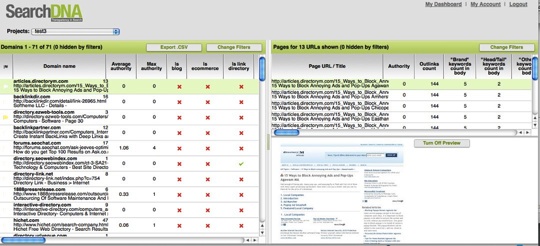SearchDNA Joins Crowded Field Of Link Analysis Tools
At SMX East today, Linkdex is introducing its new SearchDNA tool — a link analysis tool that the company says goes deeper than the already crowded field that it’s competing against. While some link tools only show up to 1,000 links (think Yahoo Site Explorer), Linkdex says SearchDNA has a database of about one trillion […]
At SMX East today, Linkdex is introducing its new SearchDNA tool — a link analysis tool that the company says goes deeper than the already crowded field that it’s competing against.
While some link tools only show up to 1,000 links (think Yahoo Site Explorer), Linkdex says SearchDNA has a database of about one trillion links. It gets that data via a partnership with Majestic SEO, which also offers its own link analysis tools. So, what makes SearchDNA different if they’re using the same data?
According to Linkdex CEO John Straw, SearchDNA goes beyond compiling a list of links and does an SEO analysis on the pages where links are found. That analysis includes about 25 key ranking factors that it uses to determine the “link authority” of pages with inbound links to a URL. The tool allows users to filter and sort inbound links based on those factors — things such as whether the keyword appears in the page title, in H1 tags, in the URL, and so forth.
SearchDNA will go into a private beta soon. When the finished product is ready for public use, Straw says he expects pricing to be about $50/month for a crawl of between 100,000 and 200,000 pages.
Other Link Analysis Tools
As I mentioned above, SearchDNA is entering an already crowded field of link analysis tools. Here’s a quick look at some of the other well known sites and tools that offer link building and link analysis:
- Majestic SEO – bills itself as the biggest database of backlinks and anchor text on the web. Offers a free account, and paid “credits” that allow users to analyze competitors.
- SEOmoz Linkscape – launched at SMX East in 2008, Linkscape says it has more than 54 billion URLs across 230 million domains in its index. Offers basic reports for free and advanced reports with a paid SEOmoz PRo membership.
- Link Diagnosis – this tool just relaunched a new version in September. It analyzes only the top 101 pages on a domain, on the theory that most inbound links will point to those pages. This tool is free.
- SEO Book Link Tools – a set of tools to help with link analysis and link building. Link Harvester is a free tool that queries the Yahoo database and analyzes backlinks. Back Link Analyzer is free, downloadable Windows software that includes anchor text analysis. And Hub Finder is a competitive link tool available to paid subscribers.
- Google Webmaster Tools – free, and shows both a list of inbound links pointing to a domain as well as the anchor text found in those inbound links.
- Yahoo Site Explorer – free, but the recent Yahoo-Microsoft deal has search marketers wondering if Site Explorer will soon disappear. Shows inbound links to a page or domain, and Yahoo has previously said the first 50 links or so are roughly shown in order of value/authority. The export function is limited to 1,000 results.
- Bing Webmaster Center – Bing’s version of what Google and Yahoo also offer, but with some additional link filtering options. Like Site Explorer, the export is limited to 1,000 results.
- SEO Spyglass – downloadable tool that comes in Free, Professional, or Enterprise versions. It shows backlink counts, anchor text, IP range, and much more info about a site’s inbound links.
- Backlink Watch – a free tool that shows the URLs, anchor text, and other inbound link data.
We’ll try to do a deeper look into SearchDNA when it’s available for beta access.
Opinions expressed in this article are those of the guest author and not necessarily Search Engine Land. Staff authors are listed here.
Related stories
